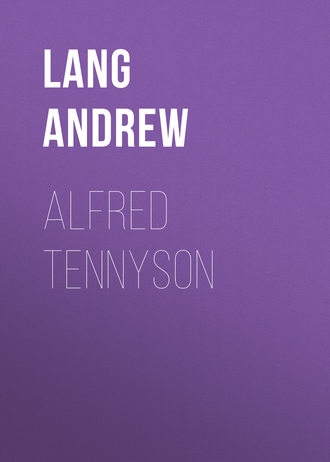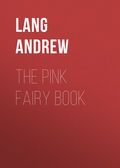
Lang Andrew
Alfred Tennyson
The romance, and the poet, in his own despite, cannot but make Lancelot the man we love, not Arthur or another. Human nature perversely sides with Guinevere against the Blameless King: —
“She broke into a little scornful laugh:
‘Arthur, my lord, Arthur, the faultless King,
That passionate perfection, my good lord —
But who can gaze upon the Sun in heaven?
He never spake word of reproach to me,
He never had a glimpse of mine untruth,
He cares not for me: only here to-day
There gleam’d a vague suspicion in his eyes:
Some meddling rogue has tamper’d with him – else
Rapt in this fancy of his Table Round,
And swearing men to vows impossible,
To make them like himself: but, friend, to me
He is all fault who hath no fault at all:
For who loves me must have a touch of earth;
The low sun makes the colour: I am yours,
Not Arthur’s, as ye know, save by the bond.”
It is not the beautiful Queen who wins us, our hearts are with “the innocence of love” in Elaine. But Lancelot has the charm that captivated Lavaine; and Tennyson’s Arthur remains
“The moral child without the craft to rule,
Else had he not lost me.”
Indeed the romance of Malory makes Arthur deserve “the pretty popular name such manhood earns” by his conduct as regards Guinevere when she is accused by her enemies in the later chapters. Yet Malory does not finally condone the sin which baffles Lancelot’s quest of the Holy Grail.
Tennyson at first was in doubt as to writing on the Grail, for certain respects of reverence. When he did approach the theme it was in a method of extreme condensation. The romances on the Grail outrun the length even of mediæval poetry and prose. They are exceedingly confused, as was natural, if that hypothesis which regards the story as a Christianised form of obscure Celtic myth be correct. Sir Percivale’s sister, in the Idyll, has the first vision of the Grail: —
“Sweet brother, I have seen the Holy Grail:
For, waked at dead of night, I heard a sound
As of a silver horn from o’er the hills
Blown, and I thought, ‘It is not Arthur’s use
To hunt by moonlight’; and the slender sound
As from a distance beyond distance grew
Coming upon me – O never harp nor horn,
Nor aught we blow with breath, or touch with hand,
Was like that music as it came; and then
Stream’d thro’ my cell a cold and silver beam,
And down the long beam stole the Holy Grail,
Rose-red with beatings in it, as if alive,
Till all the white walls of my cell were dyed
With rosy colours leaping on the wall;
And then the music faded, and the Grail
Past, and the beam decay’d, and from the walls
The rosy quiverings died into the night.
So now the Holy Thing is here again
Among us, brother, fast thou too and pray,
And tell thy brother knights to fast and pray,
That so perchance the vision may be seen
By thee and those, and all the world be heal’d.”
Galahad, son of Lancelot and the first Elaine (who became Lancelot’s mistress by art magic), then vows himself to the Quest, and, after the vision in hall at Camelot, the knights, except Arthur, follow his example, to Arthur’s grief. “Ye follow wandering fires!” Probably, or perhaps, the poet indicates dislike of hasty spiritual enthusiasms, of “seeking for a sign,” and of the mysticism which betokens want of faith. The Middle Ages, more than many readers know, were ages of doubt. Men desired the witness of the senses to the truth of what the Church taught, they wished to see that naked child of the romance “smite himself into” the wafer of the Sacrament. The author of the Imitatio Christi discourages such vain and too curious inquiries as helped to rend the Church, and divided Christendom into hostile camps. The Quest of the actual Grail was a knightly form of theological research into the unsearchable; undertaken, often in a secular spirit of adventure, by sinful men. The poet’s heart is rather with human things: —
“‘O brother,’ ask’d Ambrosius, – ‘for in sooth
These ancient books – and they would win thee – teem,
Only I find not there this Holy Grail,
With miracles and marvels like to these,
Not all unlike; which oftentime I read,
Who read but on my breviary with ease,
Till my head swims; and then go forth and pass
Down to the little thorpe that lies so close,
And almost plaster’d like a martin’s nest
To these old walls – and mingle with our folk;
And knowing every honest face of theirs
As well as ever shepherd knew his sheep,
And every homely secret in their hearts,
Delight myself with gossip and old wives,
And ills and aches, and teethings, lyings-in,
And mirthful sayings, children of the place,
That have no meaning half a league away:
Or lulling random squabbles when they rise,
Chafferings and chatterings at the market-cross,
Rejoice, small man, in this small world of mine,
Yea, even in their hens and in their eggs.”’
This appears to be Tennyson’s original reading of the Quest of the Grail. His own mysticism, which did not strive, or cry, or seek after marvels, though marvels might come unsought, is expressed in Arthur’s words: —
“‘“And spake I not too truly, O my knights?
Was I too dark a prophet when I said
To those who went upon the Holy Quest,
That most of them would follow wandering fires,
Lost in the quagmire? – lost to me and gone,
And left me gazing at a barren board,
And a lean Order – scarce return’d a tithe —
And out of those to whom the vision came
My greatest hardly will believe he saw;
Another hath beheld it afar off,
And leaving human wrongs to right themselves,
Cares but to pass into the silent life.
And one hath had the vision face to face,
And now his chair desires him here in vain,
However they may crown him otherwhere.
‘“And some among you held, that if the King
Had seen the sight he would have sworn the vow:
Not easily, seeing that the King must guard
That which he rules, and is but as the hind
To whom a space of land is given to plow
Who may not wander from the allotted field
Before his work be done; but, being done,
Let visions of the night or of the day
Come, as they will; and many a time they come,
Until this earth he walks on seems not earth,
This light that strikes his eyeball is not light,
This air that smites his forehead is not air
But vision – yea, his very hand and foot —
In moments when he feels he cannot die,
And knows himself no vision to himself,
Nor the high God a vision, nor that One
Who rose again: ye have seen what ye have seen.”
‘So spake the King: I knew not all he meant.’”
The closing lines declare, as far as the poet could declare them, these subjective experiences of his which, in a manner rarely parallelled, coloured and formed his thought on the highest things. He introduces them even into this poem on a topic which, because of its sacred associations, he for long did not venture to touch.
In Pelleas and Ettarre– which deals with the sorrows of one of the young knights who fill up the gaps left at the Round Table by the mischances of the Quest – it would be difficult to trace a Celtic original. For Malory, not Celtic legend, supplied Tennyson with the germinal idea of a poem which, in the romance, has no bearing on the final catastrophe. Pelleas, a King of the Isles, loves the beautiful Ettarre, “a great lady,” and for her wins at a tourney the prize of the golden circlet. But she hates and despises him, and Sir Gawain is a spectator when, as in the poem, the felon knights of Ettarre bind and insult their conqueror, Pelleas. Gawain promises to win the love of Ettarre for Pelleas, and, as in the poem, borrows his arms and horse, and pretends to have slain him. But in place of turning Ettarre’s heart towards Pelleas, Gawain becomes her lover, and Pelleas, detecting them asleep, lays his naked sword on their necks. He then rides home to die; but Nimue (Vivien), the Lady of the Lake, restores him to health and sanity. His fever gone, he scorns Ettarre, who, by Nimue’s enchantment, now loves him as much as she had hated him. Pelleas weds Nimue, and Ettarre dies of a broken heart. Tennyson, of course, could not make Nimue (his Vivien) do anything benevolent. He therefore closes his poem by a repetition of the effect in the case of Balin. Pelleas is driven desperate by the treachery of Gawain, the reported infidelity of Guinevere, and the general corruption of the ideal. A shadow falls on Lancelot and Guinevere, and Modred sees that his hour is drawing nigh. In spite of beautiful passages this is not one of the finest of the Idylls, save for the study of the fierce, hateful, and beautiful grande dame, Ettarre. The narrative does little to advance the general plot. In the original of Malory it has no connection with the Lancelot cycle, except as far as it reveals the treachery of Gawain, the gay and fair-spoken “light of love,” brother of the traitor Modred. A simpler treatment of the theme may be read in Mr Swinburne’s beautiful poem, The Tale of Balen.
It is in The Last Tournament that Modred finds the beginning of his opportunity. The brief life of the Ideal has burned itself out, as the year, in its vernal beauty when Arthur came, is burning out in autumn. The poem is purposely autumnal, with the autumn, not of mellow fruitfulness, but of the “flying gold of the ruined woodlands” and the dank odours of decay. In that miserable season is held the Tourney of the Dead Innocence, with the blood-red prize of rubies. With a wise touch Tennyson has represented the Court as fallen not into vice only and crime, but into positive vulgarity and bad taste. The Tournament is a carnival of the “smart” and the third-rate. Courtesy is dead, even Tristram is brutal, and in Iseult hatred of her husband is as powerful as love of her lover. The satire strikes at England, where the world has never been corrupt with a good grace. It is a passage of arms neither gentle nor joyous that Lancelot presides over: —
“The sudden trumpet sounded as in a dream
To ears but half-awaked, then one low roll
Of Autumn thunder, and the jousts began:
And ever the wind blew, and yellowing leaf
And gloom and gleam, and shower and shorn plume
Went down it. Sighing weariedly, as one
Who sits and gazes on a faded fire,
When all the goodlier guests are past away,
Sat their great umpire, looking o’er the lists.
He saw the laws that ruled the tournament
Broken, but spake not; once, a knight cast down
Before his throne of arbitration cursed
The dead babe and the follies of the King;
And once the laces of a helmet crack’d,
And show’d him, like a vermin in its hole,
Modred, a narrow face: anon he heard
The voice that billow’d round the barriers roar
An ocean-sounding welcome to one knight,
But newly-enter’d, taller than the rest,
And armour’d all in forest green, whereon
There tript a hundred tiny silver deer,
And wearing but a holly-spray for crest,
With ever-scattering berries, and on shield
A spear, a harp, a bugle – Tristram – late
From overseas in Brittany return’d,
And marriage with a princess of that realm,
Isolt the White – Sir Tristram of the Woods —
Whom Lancelot knew, had held sometime with pain
His own against him, and now yearn’d to shake
The burthen off his heart in one full shock
With Tristram ev’n to death: his strong hands gript
And dinted the gilt dragons right and left,
Until he groan’d for wrath – so many of those,
That ware their ladies’ colours on the casque,
Drew from before Sir Tristram to the bounds,
And there with gibes and flickering mockeries
Stood, while he mutter’d, ‘Craven crests! O shame!
What faith have these in whom they sware to love?
The glory of our Round Table is no more.’
So Tristram won, and Lancelot gave, the gems,
Not speaking other word than ‘Hast thou won?
Art thou the purest, brother? See, the hand
Wherewith thou takest this, is red!’ to whom
Tristram, half plagued by Lancelot’s languorous mood,
Made answer, ‘Ay, but wherefore toss me this
Like a dry bone cast to some hungry hound?
Let be thy fair Queen’s fantasy. Strength of heart
And might of limb, but mainly use and skill,
Are winners in this pastime of our King.
My hand – belike the lance hath dript upon it —
No blood of mine, I trow; but O chief knight,
Right arm of Arthur in the battlefield,
Great brother, thou nor I have made the world;
Be happy in thy fair Queen as I in mine.’
And Tristram round the gallery made his horse
Caracole; then bow’d his homage, bluntly saying,
‘Fair damsels, each to him who worships each
Sole Queen of Beauty and of love, behold
This day my Queen of Beauty is not here.’
And most of these were mute, some anger’d, one
Murmuring, ‘All courtesy is dead,’ and one,
‘The glory of our Round Table is no more.’
Then fell thick rain, plume droopt and mantle clung,
And pettish cries awoke, and the wan day
Went glooming down in wet and weariness:
But under her black brows a swarthy one
Laugh’d shrilly, crying, ‘Praise the patient saints,
Our one white day of Innocence hath past,
Tho’ somewhat draggled at the skirt. So be it.
The snowdrop only, flowering thro’ the year,
Would make the world as blank as Winter-tide.
Come – let us gladden their sad eyes, our Queen’s
And Lancelot’s, at this night’s solemnity
With all the kindlier colours of the field.’”
Arthur’s last victory over a robber knight is ingloriously squalid: —
“He ended: Arthur knew the voice; the face
Wellnigh was helmet-hidden, and the name
Went wandering somewhere darkling in his mind.
And Arthur deign’d not use of word or sword,
But let the drunkard, as he stretch’d from horse
To strike him, overbalancing his bulk,
Down from the causeway heavily to the swamp
Fall, as the crest of some slow-arching wave,
Heard in dead night along that table-shore,
Drops flat, and after the great waters break
Whitening for half a league, and thin themselves,
Far over sands marbled with moon and cloud,
From less and less to nothing; thus he fell
Head-heavy; then the knights, who watch’d him, roar’d
And shouted and leapt down upon the fall’n;
There trampled out his face from being known,
And sank his head in mire, and slimed themselves:
Nor heard the King for their own cries, but sprang
Thro’ open doors, and swording right and left
Men, women, on their sodden faces, hurl’d
The tables over and the wines, and slew
Till all the rafters rang with woman-yells,
And all the pavement stream’d with massacre:
Then, echoing yell with yell, they fired the tower,
Which half that autumn night, like the live North,
Red-pulsing up thro’ Alioth and Alcor,
Made all above it, and a hundred meres
About it, as the water Moab saw
Come round by the East, and out beyond them flush’d
The long low dune, and lazy-plunging sea.”
Guinevere is one of the greatest of the Idylls. Malory makes Lancelot more sympathetic; his fight, unarmed, in Guinevere’s chamber, against the felon knights, is one of his most spirited scenes. Tennyson omits this, and omits all the unpardonable behaviour of Arthur as narrated in Malory. Critics have usually condemned the last parting of Guinevere and Arthur, because the King doth preach too much to an unhappy woman who has no reply. The position of Arthur is not easily redeemable: it is difficult to conceive that a noble nature could be, or should be, blind so long. He does rehabilitate his Queen in her own self-respect, perhaps, by assuring her that he loves her still: —
“Let no man dream but that I love thee still.”
Had he said that one line and no more, we might have loved him better. In the Idylls we have not Malory’s last meeting of Lancelot and Guinevere, one of the scenes in which the wandering composite romance ends as nobly as the Iliad.
The Passing of Arthur, except for a new introductory passage of great beauty and appropriateness, is the Morte d’Arthur, first published in 1842: —
“So all day long the noise of battle roll’d
Among the mountains by the winter sea.”
The year has run its course, spring, summer, gloomy autumn, and dies in the mist of Arthur’s last wintry battle in the west —
“And the new sun rose, bringing the new year.”
The splendid and sombre procession has passed, leaving us to muse as to how far the poet has fulfilled his own ideal. There could be no new epic: he gave a chain of heroic Idylls. An epic there could not be, for the Iliad and Odyssey have each a unity of theme, a narrative compressed into a few days in the former, in the latter into forty days of time. The tragedy of Arthur’s reign could not so be condensed; and Tennyson chose the only feasible plan. He has left a work, not absolutely perfect, indeed, but such as he conceived, after many tentative essays, and such as he desired to achieve. His fame may not rest chiefly on the Idylls, but they form one of the fairest jewels in the crown that shines with unnumbered gems, each with its own glory.
VIII.
ENOCH ARDEN. THE DRAMAS
The success of the first volume of the Idylls recompensed the poet for the slings and arrows that gave Maud a hostile welcome. His next publication was the beautiful Tithonus, a fit pendant to the Ulysses, and composed about the same date (1833–35). “A quarter of a century ago,” Tennyson dates it, writing in 1860 to the Duke of Argyll. He had found it when “ferreting among my old books,” he said, in search of something for Thackeray, who was establishing the Cornhill Magazine. What must the wealth of the poet have been, who, possessing Tithonus in his portfolio, did not take the trouble to insert it in the volumes of 1842! Nobody knows how many poems of Tennyson’s never even saw pen and ink, being composed unwritten, and forgotten. At this time we find him recommending Mr Browning’s Men and Women to the Duke, who, like many Tennysonians, does not seem to have been a ready convert to his great contemporary. The Duke and Duchess urged the Laureate to attempt the topic of the Holy Grail, but he was not in the mood. Indeed the vision of the Grail in the early Sir Galahad is doubtless happier than the allegorical handling of a theme so obscure, remote, and difficult, in the Idylls. He wrote his Boadicea, a piece magnificent in itself, but of difficult popular access, owing to the metrical experiment.
In the autumn of 1860 he revisited Cornwall with F. T. Palgrave, Mr Val Prinsep, and Mr Holman Hunt. They walked in the rain, saw Tintagel and the Scilly Isles, and were fêted by an enthusiastic captain of a little river steamer, who was more interested in “Mr Tinman and Mr Pancake” than the Celtic boatman of Ardtornish. The winter was passed at Farringford, and the Northern Farmer was written there, a Lincolnshire reminiscence, in the February of 1861. In autumn the Pyrenees were visited by Tennyson in company with Arthur Clough and Mr Dakyns of Clifton College. At Cauteretz in August, and among memories of the old tour with Arthur Hallam, was written All along the Valley. The ways, however, in Auvergne were “foul,” and the diet “unhappy.” The dedication of the Idylls was written on the death of the Prince Consort in December, and in January 1862 the Ode for the opening of an exhibition. The poet was busy with his “Fisherman,” Enoch Arden. The volume was published in 1864, and Lord Tennyson says it has been, next to In Memoriam, the most popular of his father’s works. One would have expected the one volume containing the poems up to 1842 to hold that place. The new book, however, mainly dealt with English, contemporary, and domestic themes – “the poetry of the affections.” An old woman, a district visitor reported, regarded Enoch Arden as “more beautiful” than the other tracts which were read to her. It is indeed a tender and touching tale, based on a folk-story which Tennyson found current in Brittany as well as in England. Nor is the unseen and unknown landscape of the tropic isle less happily created by the poet’s imagination than the familiar English cliffs and hazel copses: —
“The mountain wooded to the peak, the lawns
And winding glades high up like ways to Heaven,
The slender coco’s drooping crown of plumes,
The lightning flash of insect and of bird,
The lustre of the long convolvuluses
That coil’d around the stately stems, and ran
Ev’n to the limit of the land, the glows
And glories of the broad belt of the world,
All these he saw; but what he fain had seen
He could not see, the kindly human face,
Nor ever hear a kindly voice, but heard
The myriad shriek of wheeling ocean-fowl,
The league-long roller thundering on the reef,
The moving whisper of huge trees that branch’d
And blossom’d in the zenith, or the sweep
Of some precipitous rivulet to the wave,
As down the shore he ranged, or all day long
Sat often in the seaward-gazing gorge,
A shipwreck’d sailor, waiting for a sail:
No sail from day to day, but every day
The sunrise broken into scarlet shafts
Among the palms and ferns and precipices;
The blaze upon the waters to the east;
The blaze upon his island overhead;
The blaze upon the waters to the west;
Then the great stars that globed themselves in Heaven,
The hollower-bellowing ocean, and again
The scarlet shafts of sunrise – but no sail.”
Aylmer’s Field somewhat recalls the burden of Maud, the curse of purse-proud wealth, but is too gloomy to be a fair specimen of Tennyson’s art. In Sea Dreams (first published in 1860) the awful vision of crumbling faiths is somewhat out of harmony with its environment: —
“But round the North, a light,
A belt, it seem’d, of luminous vapour, lay,
And ever in it a low musical note
Swell’d up and died; and, as it swell’d, a ridge
Of breaker issued from the belt, and still
Grew with the growing note, and when the note
Had reach’d a thunderous fulness, on those cliffs
Broke, mixt with awful light (the same as that
Living within the belt) whereby she saw
That all those lines of cliffs were cliffs no more,
But huge cathedral fronts of every age,
Grave, florid, stern, as far as eye could see,
One after one: and then the great ridge drew,
Lessening to the lessening music, back,
And past into the belt and swell’d again
Slowly to music: ever when it broke
The statues, king or saint or founder fell;
Then from the gaps and chasms of ruin left
Came men and women in dark clusters round,
Some crying, ‘Set them up! they shall not fall!’
And others, ‘Let them lie, for they have fall’n.’
And still they strove and wrangled: and she grieved
In her strange dream, she knew not why, to find
Their wildest wailings never out of tune
With that sweet note; and ever as their shrieks
Ran highest up the gamut, that great wave
Returning, while none mark’d it, on the crowd
Broke, mixt with awful light, and show’d their eyes
Glaring, and passionate looks, and swept away
The men of flesh and blood, and men of stone,
To the waste deeps together.
‘Then I fixt
My wistful eyes on two fair images,
Both crown’d with stars and high among the stars, —
The Virgin Mother standing with her child
High up on one of those dark minster-fronts —
Till she began to totter, and the child
Clung to the mother, and sent out a cry
Which mixt with little Margaret’s, and I woke,
And my dream awed me: – well – but what are dreams?”
The passage is rather fitted for a despairing mood of Arthur, in the Idylls, than for the wife of the city clerk ruined by a pious rogue.
The Lucretius, later published, is beyond praise as a masterly study of the great Roman sceptic, whose heart is at eternal odds with his Epicurean creed. Nascent madness, or fever of the brain drugged by the blundering love philtre, is not more cunningly treated in the mad scenes of Maud. No prose commentary on the De Rerum Natura, however long and learned, conveys so clearly as this concise study in verse the sense of magnificent mingled ruin in the mind and poem of the Roman.
The “Experiments in Quantity” were, perhaps, suggested by Mr Matthew Arnold’s Lectures on the Translating of Homer. Mr Arnold believed in a translation into English hexameters. His negative criticism of other translators and translations was amusing and instructive: he had an easy game to play with the Yankee-doodle metre of F. W. Newman, the ponderous blank verse of Cowper, the tripping and clipping couplets of Pope, the Elizabethan fantasies of Chapman. But Mr Arnold’s hexameters were neither musical nor rapid: they only exhibited a new form of failure. As the Prince of Abyssinia said to his tutor, “Enough; you have convinced me that no man can be a poet,” so Mr Arnold went some way to prove that no man can translate Homer.
Tennyson had the lowest opinion of hexameters as an English metre for serious purposes.
“These lame hexameters the strong-wing’d music of Homer!”
Lord Tennyson says, “German hexameters he disliked even more than English.” Indeed there is not much room for preference. Tennyson’s Alcaics (Milton) were intended to follow the Greek rather than the Horatian model, and resulted, at all events, in a poem worthy of the “mighty-mouth’d inventor of harmonies.” The specimen of the Iliad in blank verse, beautiful as it is, does not, somehow, reproduce the music of Homer. It is entirely Tennysonian, as in
“Roll’d the rich vapour far into the heaven.”
The reader, in that one line, recognises the voice and trick of the English poet, and is far away from the Chian: —
“As when in heaven the stars about the moon
Look beautiful, when all the winds are laid,
And every height comes out, and jutting peak
And valley, and the immeasurable heavens
Break open to their highest, and all the stars
Shine, and the Shepherd gladdens in his heart:
So many a fire between the ships and stream
Of Xanthus blazed before the towers of Troy,
A thousand on the plain; and close by each
Sat fifty in the blaze of burning fire;
And eating hoary grain and pulse the steeds,
Fixt by their cars, waited the golden dawn.”
This is excellent, is poetry, escapes the conceits of Pope (who never “wrote with his eye on the object”), but is pure Tennyson. We have not yet, probably we never shall have, an adequate rendering of the Iliad into verse, and prose translations do not pretend to be adequate. When parents and dominies have abolished the study of Greek, something, it seems, will have been lost to the world, – something which even Tennyson could not restore in English. He thought blank verse the proper equivalent; but it is no equivalent. One even prefers his own prose: —
Nor did Paris linger in his lofty halls, but when he had girt on his gorgeous armour, all of varied bronze, then he rushed thro’ the city, glorying in his airy feet. And as when a stall-kept horse, that is barley-fed at the manger, breaketh his tether, and dasheth thro’ the plain, spurning it, being wont to bathe himself in the fair-running river, rioting, and reareth his head, and his mane flieth back on either shoulder, and he glorieth in his beauty, and his knees bear him at the gallop to the haunts and meadows of the mares; so ran the son of Priam, Paris, from the height of Pergamus, all in arms, glittering like the sun, laughing for light-heartedness, and his swift feet bare him.
In February 1865 Tennyson lost the mother whose portrait he drew in Isabel, – “a thing enskied and sainted.”
In the autumn of 1865 the Tennysons went on a Continental tour, and visited Waterloo, Weimar, and Dresden; in September they entertained Emma I., Queen of the Sandwich Islands. The months passed quietly at home or in town. The poet had written his Lucretius, and, to please Sir George Grove, wrote The Song of the Wrens, for music. Tennyson had not that positive aversion to music which marked Dr Johnson, Victor Hugo, Théophile Gautier, and some other poets. Nay, he liked Beethoven, which places him higher in the musical scale than Scott, who did not rise above a Border lilt or a Jacobite ditty. The Wren songs, entitled The Window, were privately printed by Sir Ivor Guest in 1867, were set to music by Sir Arthur Sullivan, and published by Strahan in December 1870. “A puppet,” Tennyson called the song-book, “whose only merit is, perhaps, that it can dance to Mr Sullivan’s instrument. I am sorry that my puppet should have to dance at all in the dark shadow of these days” (the siege of Paris), “but the music is now completed, and I am bound by my promise.” The verses are described as “partly in the old style,” but the true old style of the Elizabethan and cavalier days is lost.
In the summer of 1867 the Tennysons moved to a farmhouse near Haslemere, at that time not a centre of literary Londoners. “Sandy soil and heather-scented air” allured them, and the result was the purchase of land, and the building of Aldworth, Mr Knowles being the architect. In autumn Tennyson visited Lyme Regis, and, like all other travellers thither, made a pilgrimage to the Cobb, sacred to Louisa Musgrove. The poet now began the study of Hebrew, having a mind to translate the Book of Job, a vision unfulfilled. In 1868 he thought of publishing his boyish piece, The Lover’s Tale, but delayed. An anonymously edited piracy of this and other poems was perpetrated in 1875, limited, at least nominally, to fifty copies.
In July Longfellow visited Tennyson. “The Longfellows and he talked much of spiritualism, for he was greatly interested in that subject, but he suspended his judgment, and thought that, if in such manifestations there is anything, ‘Pucks, not the spirits of dead men, reveal themselves.’” This was Southey’s suggestion, as regards the celebrated disturbances in the house of the Wesleys. “Wit might have much to say, wisdom, little,” said Sam Wesley. Probably the talk about David Dunglas Home, the “medium” then in vogue, led to the discussion of “spiritualism.” We do not hear that Tennyson ever had the curiosity to see Home, whom Mr Browning so firmly detested.
In September The Holy Grail was begun: it was finished “in about a week. It came like a breath of inspiration.” The subject had for many years been turned about in the poet’s mind, which, of course, was busy in these years of apparent inactivity. At this time (August 1868) Tennyson left his old publishers, the Moxons, for Mr Strahan, who endured till 1872. Then he was succeeded by Messrs H. S. King & Co., who gave place (1879) to Messrs Kegan Paul & Co., while in 1884 Messrs Macmillan became, and continue to be, the publishers. A few pieces, except Lucretius (Macmillan’s Magazine, May 1868) unimportant, appeared in serials.
Very early in 1869 The Coming of Arthur was composed, while Tennyson was reading Browning’s The Ring and the Book. He and his great contemporary were on terms of affectionate friendship, though Tennyson, perhaps, appreciated less of Browning than Browning of Tennyson. Meanwhile “Old Fitz” kept up a fire of unsympathetic growls at Browning and all his works. “I have been trying in vain to read it” (The Ring and the Book), “and yet the Athenæum tells me it is wonderfully fine.” FitzGerald’s ply had been taken long ago; he wanted verbal music in poetry (no exorbitant desire), while, in Browning, carmina desunt. Perhaps, too, a personal feeling, as if Browning was Tennyson’s rival, affected the judgment of the author of Omar Kháyyám. We may almost call him “the author.”







